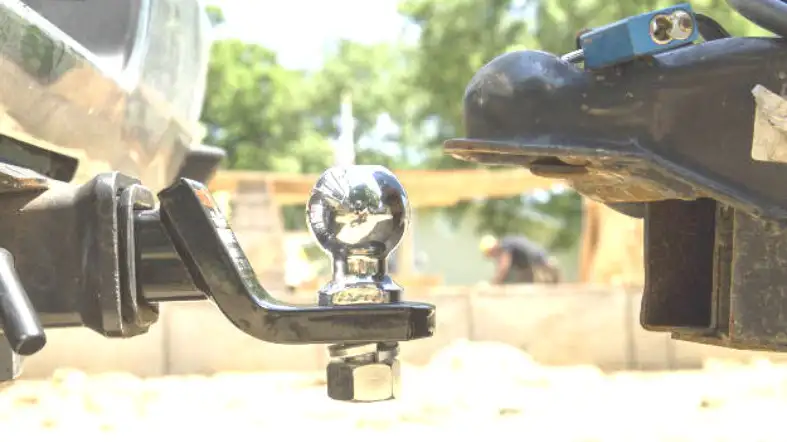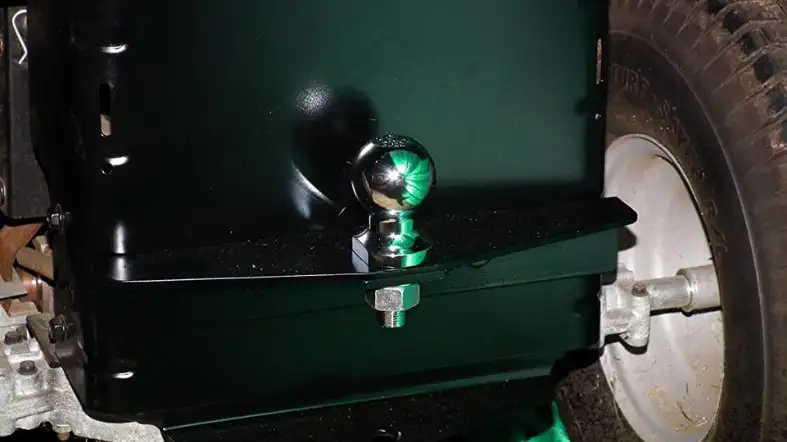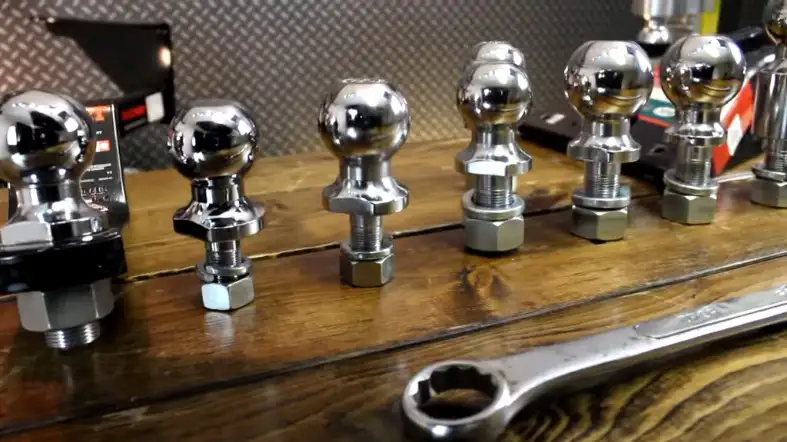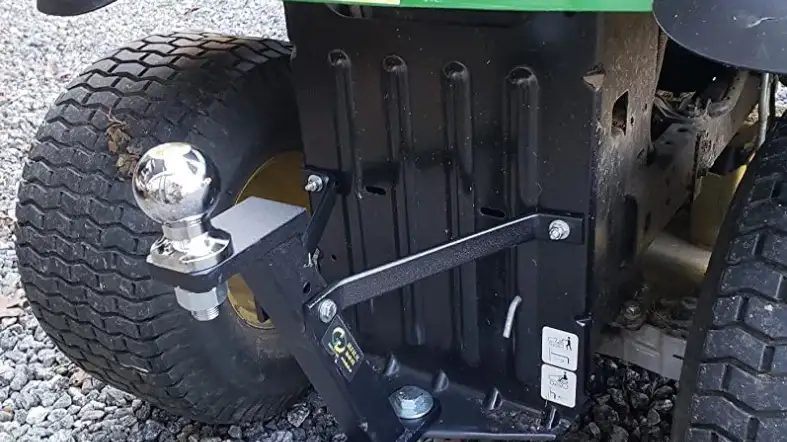Like most people, you probably do not know the right size ball your hitch needs.
And even if you know the size, it can be hard to figure out what that corresponds to in terms of a real-world object.
This blog post will help clear any confusion and provide tips on what size ball to get for your particular hitch.
What Size Hitch Ball Should I Get For My Trailer?
The most typical hitch ball size is the 2″ hitch ball, but the sizes will ultimately depend on the trailer and application.

You can get away with a smaller ball if you have a small trailer.
But if you have a larger trailer, you’ll need a bigger ball to ensure safety and stability.
Some sizes of hitch balls are given below according to the trailer size.
| Trailer | Ball Size |
|---|---|
| Light-duty | 1-7/8-inch |
| Medium trailers | 2-inch |
| Heavy trailers | 2-5/16-inch |
| Gooseneck trailers. | 3-inch |
Why do the sizes of hitch balls matter?
The size of the hitch ball on your vehicle must match the size of the trailer coupler.
If they do not check, there is a chance that the trailer could become disconnected from the vehicle while in transit.
This could lead to serious accidents or injury.
If you are still determining what size ball to get, always choose a bigger size and err on the side of caution.
This will help to ensure that your trailer stays connected to your vehicle during transport.

How to calculate the right size hitch ball for my trailer?
To calculate the correct size hitch ball for your trailer, you need to know the weight of your trailer tongue.
This information can be found in your trailer owner’s manual.
Once you know the tongue weight, select a hitch ball with a maximum capacity more remarkable than the tongue weight.
There are three main things to consider when choosing a hitch ball:
Diameter
The diameter of the hitch ball should match the size of the coupler on your trailer. The most common sizes are 1-7/8″, 2″, and 2-5/16″.
Shank length
Measure the length of the shank from the highest point of the ball to the bottom of the shank.
The shank length will need to be long enough to allow clearance between the back of your vehicle and the trailer coupler when it is fully connected.
Ball capacity
Ball capacity (tongue weight rating) is the maximum weight the hitch ball can support.
When selecting a hitch ball, choosing one with a suitable diameter, shank length, and ball capacity for your trailer is essential.
Once you have gathered this information, you can use it to find the best-size hitch ball for your trailer.
The table below shows the recommended size hitch ball for different tongue and gross trailer weights.
| Tongue Weight (lbs) | Gross Trailer Weight (inch) |
|---|---|
| 2,000-3,500 | 2″ |
| 3,500-5,000 | 1-7/8″ |
| 5,000-7,000 | 2-5/16″ |
| 7,000-9,000 | 3″ |
| 9,000-12,000 | 3-1/2″ |
| 12,000-15,000 | 4″ |
The required size hitch ball for your trailer is determined by the tongue weight and gross trailer weight, as shown in the chart.
How Do I Choose The Right Size Hitch Ball For My Trailer?

To select the correct size hitch ball for your trailer, you must first determine the weight of your trailer and the size of your hitch.
The importance of your trailer decides the size of the ball, and the size of your hitch determines the diameter of the ball.
Size
The size of the ball is affected by the size of the trailer coupler.
The most popular sizes are 1 7/8 inch, 2 inches, and 2 5/16 inch.
Make sure the size of the ball corresponds to the size of the coupler.
Material
Balls are usually steel, but aluminum and brass balls are also available.
Steel balls are the most durable, but aluminum and brass balls are lighter and may be a better choice if you are concerned about weight.
Finish
Balls are available in various finishes, including chrome, black, and powder-coated.
Choose a finish that will complement the look of your trailer.
Safety
When you’re finished towing, remove the hitch ball and store it in a safe place.
Before each tow, check the hitch ball to ensure it is still secure.
Types
There are two main types of hitch balls: standard and locking.
Standard hitch balls are the most common type and are typically used for light-duty towing.
Locking hitch balls are designed for heavy-duty towing and have a locking mechanism that secures the ball to the shank.
What Are Some Benefits Of Using A Hitch Ball?

There are many benefits of using a hitch ball. Some benefits include the following:
Easier to maneuver your trailer
It can be easier to maneuver your trailer when you have a hitch ball that is the right size.
If the hitch ball is too small, it can be challenging to move the trailer.
If the hitch ball is too large, it can be challenging to control the trailer.
Less wear and tear on your vehicle
If you have a hitch ball that is the right size, there will be less wear and tear on your vehicle.
This is because the hitch ball will be able to distribute the weight of the trailer evenly.
Prevents swaying and jostling
A hitch ball that is the right size can help to prevent your trailer from swaying and jostling.
If the ball is too small, it can cause the trailer to be unstable and rock back and forth.
This can be dangerous and cause damage to your trailer or even cause an accident.
Allows for better towing
When you have a hitch ball that is the right size, you will be able to tow your trailer better.
This is because the ball will fit snugly into the hitch, and there will be less movement.
This means that your trailer will be more stable on the road, and you will be less likely to experience any problems.
FAQS about the right size hitch ball for my trailer
What Is The Right Size Hitch Ball For My Trailer?
The right size hitch ball for your trailer is based on the tongue weight of your trailer.
You will need to select a hitch ball with a maximum capacity that is greater than the tongue weight.
What Is The Standard Size Of A Hitch Ball?
The 2 is the standard size “hitching ball.
The 2 “Hitch ball accommodates most class 3 receivers, the most popular trailer hitches.
When the medium-duty trailer hitch ball size is considered, a 2 “Hitch ball has a wide weight capacity range, allowing it to tow boat trailers, utility trailers, and campers.
What Is The Maximum Weight Capacity Of A Hitch Ball?
The maximum weight capacity of a hitch ball is typically 10,000 pounds.
It is important to check the maximum capacity of your hitch ball before towing to ensure safe operation.
What Is The Difference Between A 1-7/8″, 2″, And 2-5/16″ Hitch Ball?
The size of the ball corresponds to the size of the trailer coupler.
The 2″ and 2-5/16″ balls are typically used on larger trailers, while the 1-7/8″ ball is more common on smaller trailers.
The towing capacity is the main difference between the various sizes of hitch balls.
A 1-7/8″ ball can tow up to 2,000 pounds, while a 2″ ball can tow up to 4,000 pounds. A 2-5/16″ ball can tow up to 6,000 pounds.
Can I Use A Hitch Ball With A Different Diameter Than My Trailer Coupler?
No, the hitch ball’s diameter must match your trailer coupler’s diameter.
If you have a 2″ trailer coupler, you’ll need a 2″ hitch ball.
You may be capable of getting away with using a hitch ball slightly larger than your coupler, but this needs to be advised and may cause difficulties in the future.
Getting a hitch ball with the same diameter as your coupler is always a good idea to be safe.
Do I Need To Use A Hitch Ball With The Same Diameter As My Trailer Coupler?
The answer is no. You can use a hitch ball with a smaller diameter but not one with a larger diameter.
If you have a 2-inch coupler, you can use a 1-7/8-inch or 2-inch hitch ball.
The Bottom Lines
To conclude, knowing the right Size Ball For your Hitch is vital before buying a car.
You need to consider many things, such as the type of car, the model of the car, and the size of the ball.
It would be best if you got a smaller ball to buy a car with a smaller engine.
However, if you wish to buy a car with a larger engine, you will need a larger ball.
It is advisable to consider various factors when purchasing a hitch ball.
You must ensure that you acquire the correct ball size to avoid mishaps.
